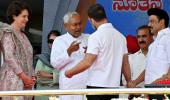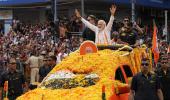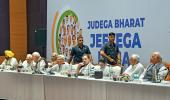'People understand Hitlershahi, tanashahi and now Modishahi.'

CPI(ML) General Secretary Dipankar Bhattacharya's involvement in politics began while he was studying at the prestigious Indian Statistical Institute in Calcutta, from where he graduated with a master's degree.
In Munmbai last fortnight to attend the meeting of the INDIA alliance, Bhattacharya tells Jyoti Punwani, "To counter the bulldozer, you need to confront it."
The concuding segment of a two-part interview:
- Part 1 of the Interview: 'We Are In A Calamity'
The word 'fascist' is often used to describe the BJP; you use it too. But how would you take this concept to the people?
You don't have to use the word. People understand Hitlershahi, tanashahi and now Modishahi.
We can take the movement against changing the Constitution to the people. The Constitution has already been damaged through the CAA [Citizenship (Amendment) Act] NRC [National Register of Citizens], through the EWS [Economically Weaker Sections] reservations, and now through the changes to the IPC [Indian Penal Code].
During the anti-CAA NRC movement, we pointed out to the people that in the Assam NRC, the majority of those who didn't make it to the final list were the poor, because it's the poor who don't have land or documents.
Incidentally, we organised a lot of Shaheen Baghs in Bihar, and unlike elsewhere, these comprised 70% Hindu women and 30% Muslim. What was the point of mobilising Muslim women who were anyway ready to protest? Our job was to mobilise non-Muslims.
We took a 30,000 strong march to the assembly, and got it to pass a unanimous resolution against the CAA NRC. Bihar became the first NDA state (Chief Minister Nitish Kumar's Janata Dal-United then ruled the state in alliance with the Bharatiya Janata Party)to do so. 80% of those who marched were Hindus.
People understand what we are saying. When the Sengol was installed in the new Parliament , we explained to the people that this was the symbol of monarchy.
We used the popular song: Mere Angney Mein Tumhara Kya Kaam Hai and changed it to Loktantra Ke Andar, Sengol Ka Kya Kaam Hai.
Opposition parties simply react to the BJP. Can you set your own agenda?
We need a national narrative. Saving democracy is most necessary not just as an end in itself, but for the poor. The BJP thinks the poor don't understand democracy. But we've seen that for the poor, land, wages are important, but so is dignity.
Our own experience can help build this narrative.
- We have the legacy of the freedom movement. There, Bhagat Singh's prediction of White Sahibs being replaced by Brown Sahibs can be used to illustrate today's situation.
- Our experience of the anti-feudal struggle. Feudalism didn't end with the abolition of zamindari.
The end of feudalism should mean an end to humiliation and caste atrocities.
We can demonstrate how feudalism is returning under the BJP: when a so-called upper caste man pees on the face of an Adivasi. - The struggle for social justice. The BJP has turned this concept into social engineering; the PM in his Independence day speech announced the Vishwakarma Yojana for OBCs. But we can't accept justice as charity in an inherently unjust society.
- Our experience of the anti-capitalist struggle. The theory used to be that the working class by default was limited in India. But that no longer holds with growing urbanism and gig workers. With urbanism comes the issue of the environment, which is now much more mainstream.
All of these used to be separate enemies of the people. Now they are all one, and that one is Modi. That is fascism. We have to combine all the energies which we would spend in these separate struggles.
We also need to be ready to fight on the streets. To counter the bulldozer, you need to confront it.

How do you take this agenda inside INDIA?
That's the question. But outside INDIA, we are free to follow it.
I think a beginning has already been made in Maharashtra, Bihar and Punjab, where the NDA has been broken.
In Punjab it was the Kisan Andolan that made the Akalis leave BJP: in Maharashtra and Bihar, it was the BJP's desire for centralised concentration of power.
On the other hand, the INDIA alliance is only growing, proving sceptics wrong. People said AAP would never join a Congress-led alliance; it did.
They said Sharad Pawar would leave after Ajit Pawar left him; he's still here.
Every party will continue with its own issue-based struggles, but as long as they identify with a basic anti-BJP position, so far so good.
Feature Presentation: Aslam Hunani/Rediff.com











 © 2025
© 2025